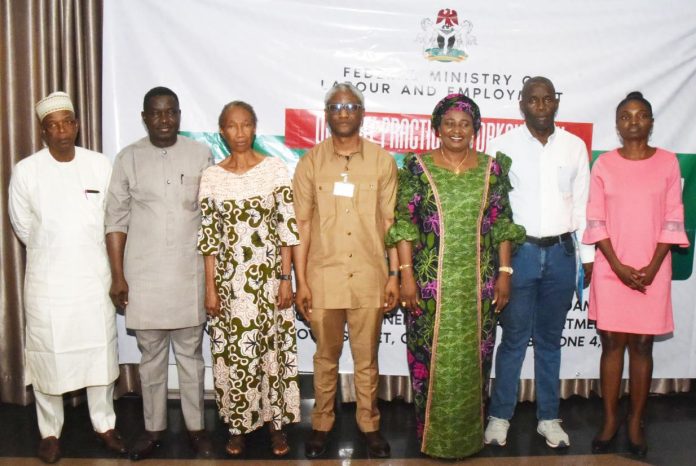The Federal Government in furtherance of its commitment to fulfilling statutory obligations as a member state of the ILO and ensuring best practices in the country’s Labour Administration System, has vowed to improve the working conditions of Nigerian workers to meet international best standards.
The Permanent Secretary, Federal Ministry of Labour and Employment, Ms Kachollom Daju mni, said this while speaking at a One-day Practical Workshop on Report Rendition on the Application of Unratified International Labour Organisations (ILO) Conventions and Recommendations, organisied by the Productivity Measurement and Labour Standards (PM&LS) department of the Ministry.
Daju maintained that the Federal Government acknowledges that a stable and harmonious industrial relations climate as well as decent work for all is critical instruments for the realization of the National Development Plan 2021-2025, targets of the 2030 Sustainable Development Goals (SDGs) with regards to job creation and sustained development in Nigeria. She explained that Nigeria as a committed member state of the ILO has and is taking proactive measures in the application of the ILO’s declaration on social justice and fair globalization and its follow up, centenary declaration for the future of work, the global call to action for human-centered recovery from the COVID-19 crisis and the Sustainable Development Goals.
She said that the country through the ministry, at the behest of ILO is to provide information in a Report Form on ILO convention No. 150 and ILO Recommendation No. 158 to facilitate the supply of information on the structure and functions of Labour Administration System which will assist in addressing the diversity in employment arrangements as reflected in the ILO Conventions and Recommendations. Adding that the Report Form was also designed to meet the needs of the upcoming General Survey being prepared by the ILO committee of Experts on the Application of Conventions and Recommendations (CEACR)
The Permanent Secretary, represented by the Director, Trade Union Services and Industrial Relations (TUSIR), Mr Emmanuel Igbinosun, noted that the workshop was aimed at collating reports from various MDAs and social partners of the Ministry that will charter a path forward with regards to current and emergent trends as well as employment arrangements which has gained great relevance with the transformation of the world of work. She called on participants to maximize the opportunity availed them by the workshop.
Speaking earlier, the Director PM&LS, Mrs Juliana Adebambo, said that the workshop was organised to give effect to unratified conventions and Recommendations saying that timely and effective application of International Labour Standards and prompt reporting on them is recognized as one of the best strategies of strengthening Labour Administration and promoting decent work in the country. She added that if the goal of the programme was realized, the ministry will be able to fulfill its obligations within a specific time frame.
Present at the workshop were representatives of the Nigeria Labour Congress (NLC), Trade Union Congress (TUC), Nigeria Employers’ Consultative Association amongst others.




